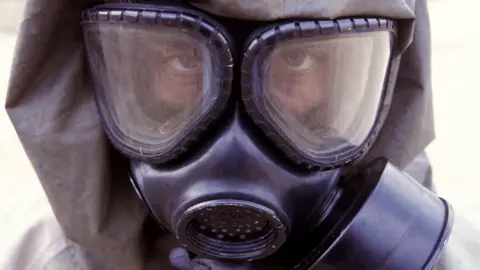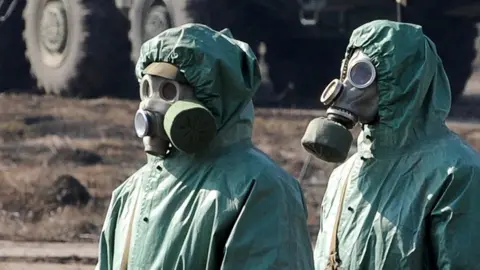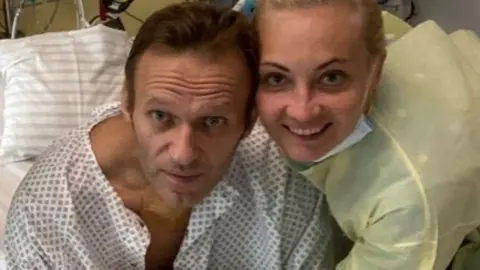Ukraine conflict: How will we know if Russia used chemical weapons?
 Getty Images
Getty ImagesBritain has reacted with concern at unconfirmed reports of an alleged chemical attack in the besieged city of Mariupol.
The alarm was raised by some of the last Ukrainian soldiers still holding out against the Russian assault there.
They are from the Azov Battalion, a small but controversial element of Ukraine's National Guard due to their far right tendencies.
They claim that after a Russian drone flew over, there was a cloud of smoke and three of their members experienced breathing difficulties. These could be symptoms consistent with a chemical or poison gas attack but this will be hard to prove.
How will we know if there was a chemical attack?
The global watchdog for chemical weapons - the Organisation for the Prohibition of Chemical Weapons - would usually be called in to assess any evidence. But that will be challenging in Mariupol, for obvious reasons.
The former British Army officer Hamish de Bretton-Gordon, a chemical weapons expert, cautioned that even if uncontaminated samples could be collected from the scene they would need to be taken to another country for analysis.
This, he said, would take some time.
Western governments are also able to examine satellite imagery and other intelligence for any signs that chemical weapons units or vehicles were nearby, he said. But that won't give any hard and fast answers any time soon.
What would the response be?
Britain's Armed Forces Minister James Heappey said the incident needed proper investigation. He said that if Russia were found to have used banned chemical weapons then "nothing was ruled out" in terms of Nato's response.
So what does that mean exactly?
Ministers won't be drawn on the details. Even if it could be proved to be a chemical attack, Nato would still be extremely reluctant to become directly involved in the fighting inside Ukraine's borders.
At most it would probably lead to yet more sanctions on Russia and a further stepping up of military hardware exports to Ukraine.
What are chemical weapons?
Chemical weapons are any kind of munitions that carry toxins or chemical substances that attack the body's system.
There are different categories of chemical weapons.
Choking agents like phosgene attack the lungs and respiratory system, causing victims to drown in their lungs' secretions.
There are blister agents, like mustard gas, which burn the skin and blind people.
Then there is the most lethal category of all: nerve agents, which interfere with the brain's messages to the body's muscles. A tiny drop of these can be fatal. Less than 0.5mg of VX nerve agent, for example, is enough to kill an adult.
 Getty Images
Getty ImagesAll of these so-called chemical agents can be used in warfare in artillery shells, bombs and missiles.
However, all are strictly prohibited by the Chemical Weapons Convention of 1997 which was signed by the vast majority of nations, including Russia.
When have they been used before?
Chemical weapons were used in World War One, in the Iran-Iraq war in the 1980s, and more recently by the Syrian government against rebel forces.
Russia says it destroyed the last of its chemical weapons stocks in 2017, but since then there have been at least two chemical attacks blamed on Moscow.
The first was the Salisbury attack of March 2018.
A former KGB officer and defector, Sergei Skripal, was poisoned along with his daughter by the nerve agent Novichok. Russia denied responsibility and came up with over 20 different explanations for who else could have done it.
However, investigators concluded it was the work of two officers from Russia's GRU military intelligence. To show their disgust, countries around the world expelled a total of 128 Russian spies and diplomats.
Then, in August 2020, the prominent Russian opposition activist Alexei Navalny was also poisoned with Novichok and narrowly escaped death.
 Getty Images
Getty ImagesCould Russia use chemical weapons in Ukraine?
Some military analysts fear that if the coming Russian assault in the Donbas fails to achieve its objectives then, in desperation, President Putin could authorise the use of chemical weapons on stubborn defenders.
If Russia were to use weapons like poison gas in this war, it would be seen as crossing a major red line, most probably prompting calls for the West to take action.
Chemical weapons played a decisive role in the Syrian government's campaign to suppress resistance in rebel-held cities, killing and incapacitating fighters and civilians alike.
The Syrian air force, which reportedly carried out dozens of these attacks, was supported and protected by the Russian air force. The general in charge of Russia's war effort there, Aleksandr Dvornikov, has now been appointed to run Moscow's war against Ukraine.
The unpleasant truth about chemical weapons is that if you have a protracted war, where the attacking military are trying to break the will of defending forces, then these weapons are one hideously effective way to achieve that.
They not only permeate into cellars and bunkers, they can result in an agonising death and hence are also a psychological weapon of terror.

War in Ukraine: More coverage
- LIVE: Latest updates from on the ground
- KYIV: Capital turns into a fortress
- MERCENARIES: How Russia is recruiting reinforcements
- HERITAGE: Lviv hides its priceless artefacts
- IN DEPTH: Full coverage of the conflict
